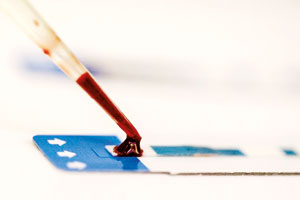Sunday Times 2
New blood test can identify more than 20 different types of cancer
View(s):
The unnamed test looks for genetic changes linked to disease development (Reuters)
A new blood test could pick up on more than 20 different types of cancer, research suggests. Harvard University scientists created a test that looks for genetic changes associated with the development of tumours.
When tried on nearly 3,600 blood samples, it correctly identified cancer patients in 99.4 per cent of cases, with just 0.6 per cent being misdiagnoses. The scientists hope their test will allow patients to be diagnosed and treated sooner, boosting their chance of success. It is unclear when it may be available.
The test looks for abnormal methylation, a process which occurs when so-called methyl groups are added to a DNA molecule.
Methylation controls whether a gene is ‘on’ or ‘off’, with certain variations being associated with cancer. Methylated DNA gets shed by cancer cells into the bloodstream when a tumour dies. Existing ‘liquid biopsies’ detect genetic mutations or other cancer-related changes to DNA.
“Our work indicated methylation-based assays outperform traditional DNA-sequencing approaches to detecting multiple forms of cancer in blood samples,” lead author Dr Geoffrey Oxnard said.
“The results of the new study demonstrate such assays are a feasible way of screening people for cancer.”
The scientists analysed 3,583 blood samples. Of which, 1,530 had been drawn from cancer patients and 2,053 from people without the disease. The patients’ samples were made up of more than 20 forms of the disease, including pancreatic, ovarian, colorectal and breast.
Overall, the test, which has yet to be named, picked up a ‘cancer signal’ 99.4 per cent of the time. The scientists then looked into whether the test could narrow down where the cancer started, getting it right 89 per cent of the time.
When analysing ‘high mortality cancers’, it detected the disease in 76 per cent of cases overall. Within this group, the sensitivity for stage one cancer was 32 per cent, stage two 76 per cent, stage three 85 per cent and stage four 93 per cent.
“Detecting even a modest per cent of common cancers early could translate into many patients who may be able to receive more effective treatment if the test were in wide use,” Dr Oxnard told The Telegraph.
Full results will be presented at the European Society for Medical Oncology 2019 Congress in Barcelona. Health ministers have pledged for three quarters of cancer patients to be diagnosed at stage one or two by 2028.
Britain ranks bottom of international league tables for cancer survival, two decades behind some countries. This week an independent review of NHS cancer screening is set to warn ‘confusion and delays’ is costing lives.
The review reportedly calls for Public Health England to be stripped of its role in overseeing diagnoses. When diagnosed early, cancer tumours are smaller and have not spread. Once the disease has metastasised, treatment becomes more difficult.
When it comes to bowel cancer, nine of 10 patients will survive more than five years if diagnosed at the earliest stage, Cancer Research UK statistics show. And more than 90 per cent of women diagnosed with breast cancer at the earliest stage live for at least five years compared to around 15 per cent diagnosed at the most advanced stage.
© Daily Mail, London

